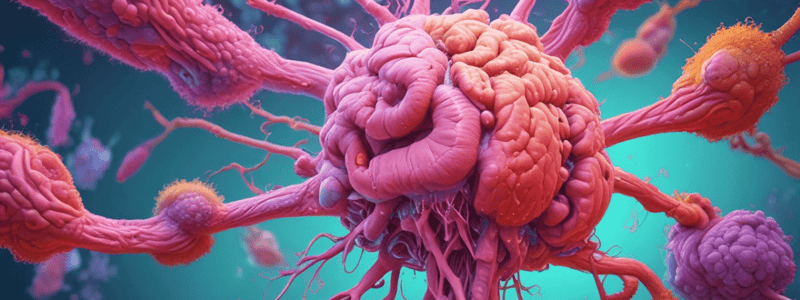Podcast
Questions and Answers
What is the medical term for the ability of the body to destroy and resist infection?
What is the medical term for the ability of the body to destroy and resist infection?
- Inflammation
- Infectious disease
- Immunity (correct)
- Infection control
Which term refers to the invasion of body tissues by disease-causing pathogens?
Which term refers to the invasion of body tissues by disease-causing pathogens?
- Infectious disease (correct)
- Microorganism
- Local infection
- Inactive stage
What is the term for the condition in which the body reacts to injury, irritation, or infection, characterized by redness, heat, pain, and swelling?
What is the term for the condition in which the body reacts to injury, irritation, or infection, characterized by redness, heat, pain, and swelling?
- Immunity
- Infectious disease
- Inflammation (correct)
- Infection control
What is the term for the methods used to eliminate or reduce the transmission of infectious organisms?
What is the term for the methods used to eliminate or reduce the transmission of infectious organisms?
Which term refers to a stage where some bacteria form a protective coating around themselves to protect them from harsh environments?
Which term refers to a stage where some bacteria form a protective coating around themselves to protect them from harsh environments?
What is the term for a disease caused by pathogenic microorganisms that enter the body?
What is the term for a disease caused by pathogenic microorganisms that enter the body?
'Transmission of blood or body fluids through contact with an intermediate contaminated object' refers to:
'Transmission of blood or body fluids through contact with an intermediate contaminated object' refers to:
Which type of immunity can be a sign of good health?
Which type of immunity can be a sign of good health?
What type of immunity is developed after recovering from a specific disease?
What type of immunity is developed after recovering from a specific disease?
Which term describes the body's ability to resist infection without prior exposure to the pathogen?
Which term describes the body's ability to resist infection without prior exposure to the pathogen?
What is the term for the phenomenon where antibodies are transferred from mother to fetus through the placenta?
What is the term for the phenomenon where antibodies are transferred from mother to fetus through the placenta?
Which type of immunity involves the use of vaccines to stimulate an immune response?
Which type of immunity involves the use of vaccines to stimulate an immune response?
What does MRSA stand for?
What does MRSA stand for?
Why is MRSA highly resistant to conventional treatments?
Why is MRSA highly resistant to conventional treatments?
Which statement accurately describes MRSA?
Which statement accurately describes MRSA?
How does MRSA differ from typical infection bacteria?
How does MRSA differ from typical infection bacteria?
What makes MRSA a challenging infection to treat?
What makes MRSA a challenging infection to treat?
What is the protective coating that some bacteria can form around themselves to survive harsh environments called?
What is the protective coating that some bacteria can form around themselves to survive harsh environments called?
Which term refers to the ability of certain bacteria to enter an inactive stage with a protective coating?
Which term refers to the ability of certain bacteria to enter an inactive stage with a protective coating?
What is the process by which some bacteria form a biofilm to shield themselves known as?
What is the process by which some bacteria form a biofilm to shield themselves known as?
Which term describes the ability of bacteria to protect themselves in harsh conditions by forming a shield?
Which term describes the ability of bacteria to protect themselves in harsh conditions by forming a shield?
What is the name for the protective mechanism some bacteria employ by encasing themselves during adverse conditions?
What is the name for the protective mechanism some bacteria employ by encasing themselves during adverse conditions?
What is the term for an organism that is too small to be seen by the naked eye?
What is the term for an organism that is too small to be seen by the naked eye?
Which of the following describes the size of a microorganism?
Which of the following describes the size of a microorganism?
What is the term for a protective barrier that some microorganisms can form around themselves in harsh conditions?
What is the term for a protective barrier that some microorganisms can form around themselves in harsh conditions?
Which term refers to the capacity of bacteria to enter a dormant state with a protective covering?
Which term refers to the capacity of bacteria to enter a dormant state with a protective covering?
What is the medical term for the body's ability to fight off infections and diseases?
What is the medical term for the body's ability to fight off infections and diseases?
Which of the following best describes mildew?
Which of the following best describes mildew?
What is the primary impact of mildew?
What is the primary impact of mildew?
Why is mildew not a concern for human infections?
Why is mildew not a concern for human infections?
Which of the following is a common misconception about mildew?
Which of the following is a common misconception about mildew?
What distinguishes mildew from harmful pathogens?
What distinguishes mildew from harmful pathogens?





